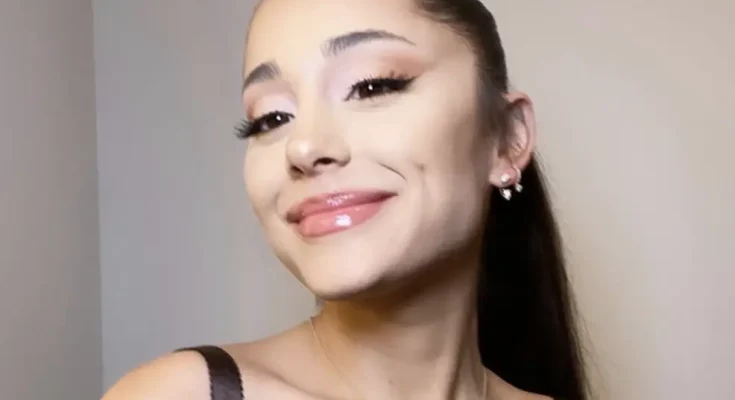Ariana Grande has drawn a sharp public rebuke from the White House after the singer reshared a message on Instagram questioning whether supporters of President Donald Trump have seen their lives improve during his second term, an exchange that pushed the pop star into the thick of partisan debate nine months into the administration. In an Instagram Story posted on Sunday, Grande amplified a post by podcast host Matt Bernstein that framed a direct challenge to Trump voters, while on Monday the White House responded via Deputy Press Secretary Kush Desai with a statement that quoted the title of one of Grande’s hit collaborations and argued the president’s policies had delivered economic gains.
The message Grande circulated began, “I want to check in with trump voters,” before continuing: “i have one very genuine question: it’s been 250 days. now that immigrants have been violently torn from their families and communities have been destroyed, now that trans people have been blamed for virtually everything and live in fear, now that free speech is on the brink of collapse for us all — has your life gotten better?” The post then pressed a series of pointed follow-ups: “have your groceries gotten cheaper? has your health insurance premium gone down? has your work/life balance improved? can you take a vacation yet? are you happier? has the widespread suffering of others paid off for you in the way he promised it would, or are you still waiting?” Grande did not add her own caption to the repost.
The White House statement arrived within a day. “Save your tears, Ariana. Because President Trump’s actions ended Joe Biden’s inflation crisis and are bringing in trillions in new investments,” Desai said, invoking the title “Save Your Tears” and continuing with a reference to the live-events marketplace: “He even signed an executive order just like magic that paved the way for the FTC to crack down on Ticketmaster for ripping off Ariana Grande’s concert-going fans. Get well soon, Ariana!” Entertainment industry outlets quoted the response as the administration’s formal reply to the Instagram Story.
The exchange marked one of Grande’s most overt political interventions since the 2024 election, when she publicly backed then–Vice President Kamala Harris’s campaign after President Joe Biden withdrew from the race. In coverage of the Instagram repost and the White House’s reply, entertainment publications noted that Grande’s endorsement of Harris was on the record and that she has periodically used her large social media following to support causes tied to LGBTQ+ rights and to humanitarian relief.
News outlets tracking the episode framed Grande’s Story as a “rare political statement” that divided commenters and drew a wave of replies from both supporters and critics of the administration. Summaries of the online reaction highlighted how the phrasing of the original post—asking if life had “gotten better” for Trump voters—became a focal point for arguments over the president’s record on consumer prices, immigration enforcement and transgender rights. Those accounts also emphasised that Grande herself had not expanded on the repost with additional commentary.
The New York Post, which collated social-media reactions to the Story, reported that pushback came quickly from Trump supporters who dismissed the questions as out of touch, while fans sympathetic to Grande echoed the post’s concerns about civil liberties and minority protections. The tabloid’s coverage also centred on the same set of lines from the Bernstein post—“Has your life gotten better?” and the list of household metrics such as groceries and health insurance premiums—that dominated discussion across platforms.
Beyond the reaction online, the White House reply drew attention for its rhetorical approach. By weaving in song titles—“Save Your Tears” and “just like magic”—and pointing to a purported executive action tied to federal scrutiny of ticketing practices, the statement attempted to recast Grande’s critique into a claim that some of the administration’s policies benefit her own audience. Desai’s title and role have been detailed in earlier reporting about staff appointments in January, when Trump named him deputy press secretary; those profiles described a communications operative with Republican Party experience elevated to the White House press operation at the outset of the term.
Coverage of the Instagram post underscored the timing of the message—“250 days” into the term—reflecting a point late in September when supporters and opponents of the administration have been arguing over early-term benchmarks. Outlets that reproduced the text noted that the post cited immigration raids and what it described as “transphobic rhetoric” alongside concerns about free speech, positioning the collection of issues as a test of whether promised improvements had materialised for voters who backed Trump’s return to office. The framing placed pocketbook topics alongside civil-rights questions in a way that suggested a single referendum on quality of life.
Grande’s political footprint predates the current exchange. In the years after the 2017 Manchester Arena bombing, she organised the One Love Manchester benefit, a broadcast special that drew a global audience and raised millions for victims—an event that contributed to her public persona as an artist willing to leverage star power in response to national trauma. More recently, she was among entertainers who signed an Artists4Ceasefire letter urging a halt to fighting in Gaza, and she used her accounts to promote humanitarian fundraising. While distinct from partisan politics, those actions formed the backdrop to the decision to share Bernstein’s post, which was unambiguously aimed at the president’s supporters.
The White House’s invocation of Ticketmaster connected the political argument to a long-running complaint among concertgoers about pricing and fees in the live-music industry. In presenting that claim, the administration positioned consumer-protection efforts as a concrete way in which policy intersects with the interests of Grande’s fanbase. The statement did not cite specific enforcement actions or timelines in its wording; outlets reproduced the line as a White House assertion delivered as part of a broader rebuttal of the singer’s post.
TheWrap, which first published verbatim excerpts of both the Instagram message Grande shared and the White House reply, reported that the singer had also used her social channels to console supporters in the immediate aftermath of the 2024 election. “Holding the hand of every person who is feeling the immeasurable heaviness of this outcome today,” she wrote then, a line that became, in subsequent reporting, one of the reference points for her public responses to political flashpoints over the past year. The site’s account of the current exchange placed the repost and the White House’s statement in a sequence spanning Sunday and Monday.
As the argument travelled, Yahoo and Billboard amplified the White House’s phrasing—“Save your tears, Ariana, because President Trump’s actions ended Joe Biden’s inflation crisis and are bringing in trillions in new investments”—presenting the language as the administration’s official comment and noting that it came after Grande’s Story was widely shared. Those summaries mirrored TheWrap’s transcription of the message and added that the administration claimed credit for consumer-protection efforts it said would benefit Grande’s audience.
The outlines of Grande’s stance are consistent with earlier public positions. During the 2024 race she endorsed Harris and encouraged turnout, and in subsequent months she signalled support for transgender advocacy groups as rule changes affecting recognition and protections became points of contention. Those moves fit within a pattern of occasional interventions on specific issues rather than sustained political campaigning, a cadence that lent the latest Instagram repost added visibility.
Entertainment publications that covered the exchange also cited Grande’s professional calendar, noting that she is preparing for a 2026 arena tour in support of her 2024 album and remains central to the release cycle around the second instalment of the “Wicked” films. Those details served as context for why the White House’s Ticketmaster line was crafted as it was: to argue that fans of a touring artist stand to gain from the administration’s consumer agenda at the same moment the artist herself was casting doubt on whether supporters had seen promised benefits.
In tone and substance, the administration’s response stood apart from the practice of ignoring celebrity criticism. By responding directly and on the record—citing economic claims and anchoring them in cultural references—the deputy press secretary’s statement guaranteed that the argument would reach audiences beyond politics-specific news consumers. At the same time, the reply sharpened the contrast invited by the original Instagram text, which set out a checklist of everyday measures—groceries, insurance, work-life balance—against which it suggested voters could evaluate the success of the administration’s programme.
The precise impact of the volley is difficult to gauge, and neither the administration nor Grande had, by Monday evening, offered additional comment beyond the initial Instagram Story and the deputy press secretary’s statement. But the interaction added a new entry to a catalogue of recent episodes in which entertainers’ social-media posts have prompted formal responses from government press operations—a list that mirrors the increasing willingness of officials to treat celebrity commentary as worthy of rebuttal when it lands within the political news cycle. The speed of the exchange—Story on Sunday, statement on Monday—also reflected the accelerated tempo of digital-age messaging in which cultural figures and political offices compete for the same slices of public attention.
For Grande, whose public image was shaped in part by moments of collective mourning and civic mobilisation, the decision to reshare Bernstein’s post aligned with a strain of advocacy that centres on the protection of vulnerable communities and the scrutiny of everyday economic stress. For the White House, the rhetorical flip—redirecting the conversation to inflation, investment and ticketing fees—signalled a preference to meet celebrity criticism with programmatic talking points tailored to the critic’s audience. It is that friction—between an artist’s platform used to ask if life “has gotten better” and an administration’s insistence that it has—that defined the episode as it ricocheted across entertainment and political media to start the week.



